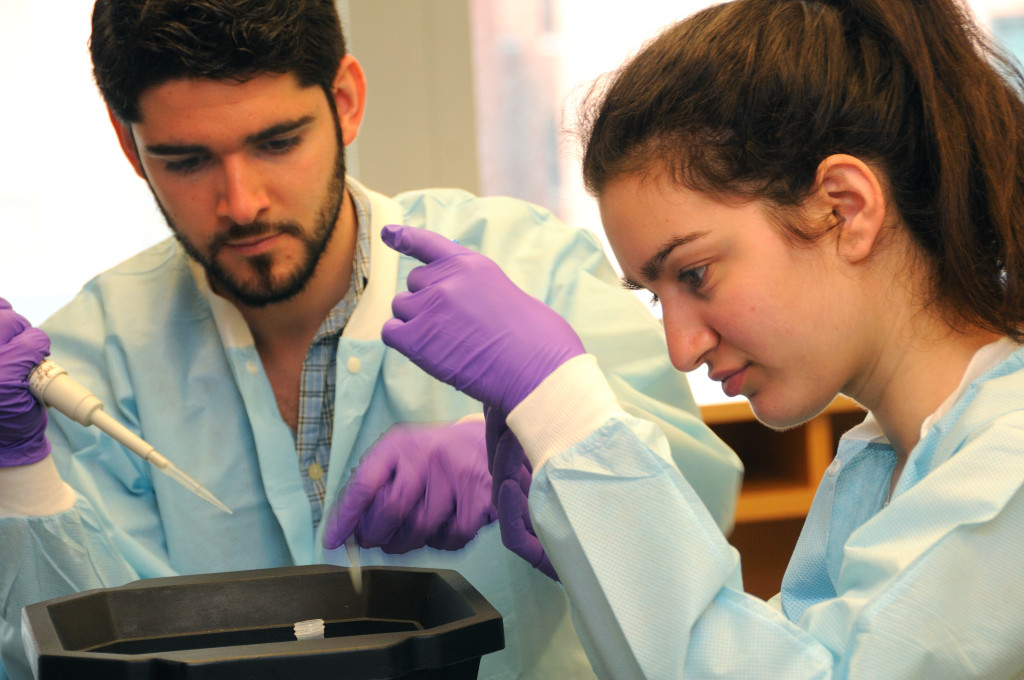
Spring semester may be over, but for a small group of Penn students, the lab is now their second home.
This year, the Mack Institute is once again sponsoring Penn’s International Genetically Engineered Machine (iGEM) student team. iGEM is a large undergraduate synthetic biology competition in which students use standard biological parts to build biological systems. The students work on their projects all summer and present their machines in the fall.
The Penn team, which includes members Abheek Basu, Daniel Cabrera, Mahamad Charawi, Danielle Fields, Brad Kaptur, and Josh Tycko, is working on epigenetics, the study of changes in gene expression caused by mechanisms other than changes in the DNA sequence.
“Essentially, our goal is to use targeted gene silencing to focus on cancer cells,” said Cabrera. By controlling methylation—a process by which a gene’s behavior is altered, but the gene itself isn’t changed—they control how the genes in each cell are expressed.
“The primary impact of a successful project would allow scientists to control cancer, which is known to be caused, in part, by certain epigenetic changes,” said Tycko.
The bulk of Mack Institute funding is funneled toward ordering materials for the project. The team will purchase customized DNA sequences, reagents, experiment testing kits, and biological enzymes.
iGEM is a very student-driven project, which makes it markedly different from other undergraduate research opportunities as it offers students independence.
“I’d say that’s the most rewarding aspect [of the project],” said Tycko. “We have our own lab, goals, and project, [and we make] our own decisions. Of course, we run our decisions by our advisors as necessary, but you’re essentially your own boss. This prepares us [to attain] our goals as career scientists.”
The interdisciplinary nature of synthetic biology is yet another draw for the team, as the field attracts people with very different interests and strengths. “It’s the next generation of technology,” said Cabrera.
“We want to pave the way for epigenetic research and open the eyes of synthetic biology to epigenetics,” said Basu. “While some scientists have researched epigenetics and synthetic biology for years, there has been no work done at the intersection of the two fields.” Basu cited the creative aspect of the project as a positive point. “We’re working with biobricks. They’re essentially like biological Legos, which caught my imagination.”
The Penn iGEM team is a mix of students with very different academic backgrounds—from computer science majors to mathematics majors to bioengineers and other students in the dual-degree Jerome Fisher Program in Management and Technology, which is administered jointly by Wharton and SEAS.
Though the project is definitely time-consuming—staying in the laboratory until 3:00 a.m. is a regular occurrence for the team—the diverse strengths of the team are an enormous asset in project completion and working through obstacles.
“Each person brings a lot to the table from a different area of expertise,” said Fields. According to Fields, each team member sees things from a unique viewpoint, so the team can tackle problems in a collective manner.
“We work toward what the group feels is the ultimate best solution,” said Charawi.
The iGEM team will travel to Toronto for competition in the fall.
“We would love to thank the Mack Institute for its generous funding and support,” said Kaptur.




Mis saludos para Daniel Cabrera, le deseo los mayores éxitos al equipo en esta investigación que contribuirá a controlar el cáncer.